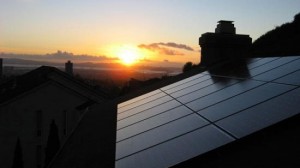Energy Efficiency
Take your time to review all your options before signing a solar panel lease agreement.
Take your time to review all your options before signing a solar panel lease agreement.
When it comes to exploring renewable energy options for your home, solar panels usually are one of the first options available. Getting off the grid and producing your own energy is an admirable goal, one that could pay you back with dividends if done right. The upfront costs of installing a home solar power system can be daunting, with costs in the $10,000 to $35,000 range, sticker shock can often turn people off. Other options do exist, such as leasing the solar panel installation, though before you sign on the dotted line you should understand all the facts of solar leasing options.
 The easiest way to describe a residential solar lease is to draw a parallel to a standard auto lease. When leasing a car you don’t actually own the car, you have the right to use it for a certain amount of time. Just like a solar lease program, the leasing company will install, maintain and allow you to use the solar panel system during the term of the lease. Again drawing parallels to a car lease, there are no money down options and optional upgrades such as increased wattage, each option may impact your monthly payment. Different from a car lease, solar system leases can last up to 20 years, meaning you need to be very sure you plan to be in your home for a while. At the end of the lease term, some companies offer the ability to purchase the units at a reduced rate, uninstall the solar system or upgrade to a newer model. One of the leaders in the space, SolarCity, claims that their system provides a $30 per month savings on energy costs for a typical 3 bedroom home. They go on to say that as traditional energy costs rise; your savings will increase since you don’t rely fully on the power grid.
The easiest way to describe a residential solar lease is to draw a parallel to a standard auto lease. When leasing a car you don’t actually own the car, you have the right to use it for a certain amount of time. Just like a solar lease program, the leasing company will install, maintain and allow you to use the solar panel system during the term of the lease. Again drawing parallels to a car lease, there are no money down options and optional upgrades such as increased wattage, each option may impact your monthly payment. Different from a car lease, solar system leases can last up to 20 years, meaning you need to be very sure you plan to be in your home for a while. At the end of the lease term, some companies offer the ability to purchase the units at a reduced rate, uninstall the solar system or upgrade to a newer model. One of the leaders in the space, SolarCity, claims that their system provides a $30 per month savings on energy costs for a typical 3 bedroom home. They go on to say that as traditional energy costs rise; your savings will increase since you don’t rely fully on the power grid.
As with any major purchase or financial decision you should do your homework thoroughly and a solar lease is no exception. Review the lease agreement’s timeframe, as we noted above, solar leases tend to be for long periods of time. This means you are legally bound to the unit for decades or risk stiff penalties in order to break the lease. While solar power system installations typically increase the value of your home, a solar lease could make it worth less than your neighbors. This is because potential buyers may not want to assume the debt or do not qualify to assume it, leaving you stuck. Additionally, since you don’t own the solar power system, you likely won’t be able to apply for the tax credits, that reward is given to the leasing company and is one of the ways they make money. The fine print can get you as well; some companies increase their monthly rates each year, reducing your overall savings. Lastly, similar to the auto lease example, at the end of the lease term, you are left with no ownership or a system that will continue to provide renewable energy.
A solar lease is yet another option available to those looking for a sustainable living. While a solar lease has its pros and cons, it is really up to you to decide if it is right for your home. From an environmental point of view, it is a way to increase renewable energy production, lessening our dependence on fossil fuels. From an economic viewpoint, it puts people to work and offers a low cost method of getting off the grid. We are of the opinion that anything good for the environment which takes us closer to a sustainable earth is worth at least giving some careful consideration.
Reply to Ray Boggs Cancel reply